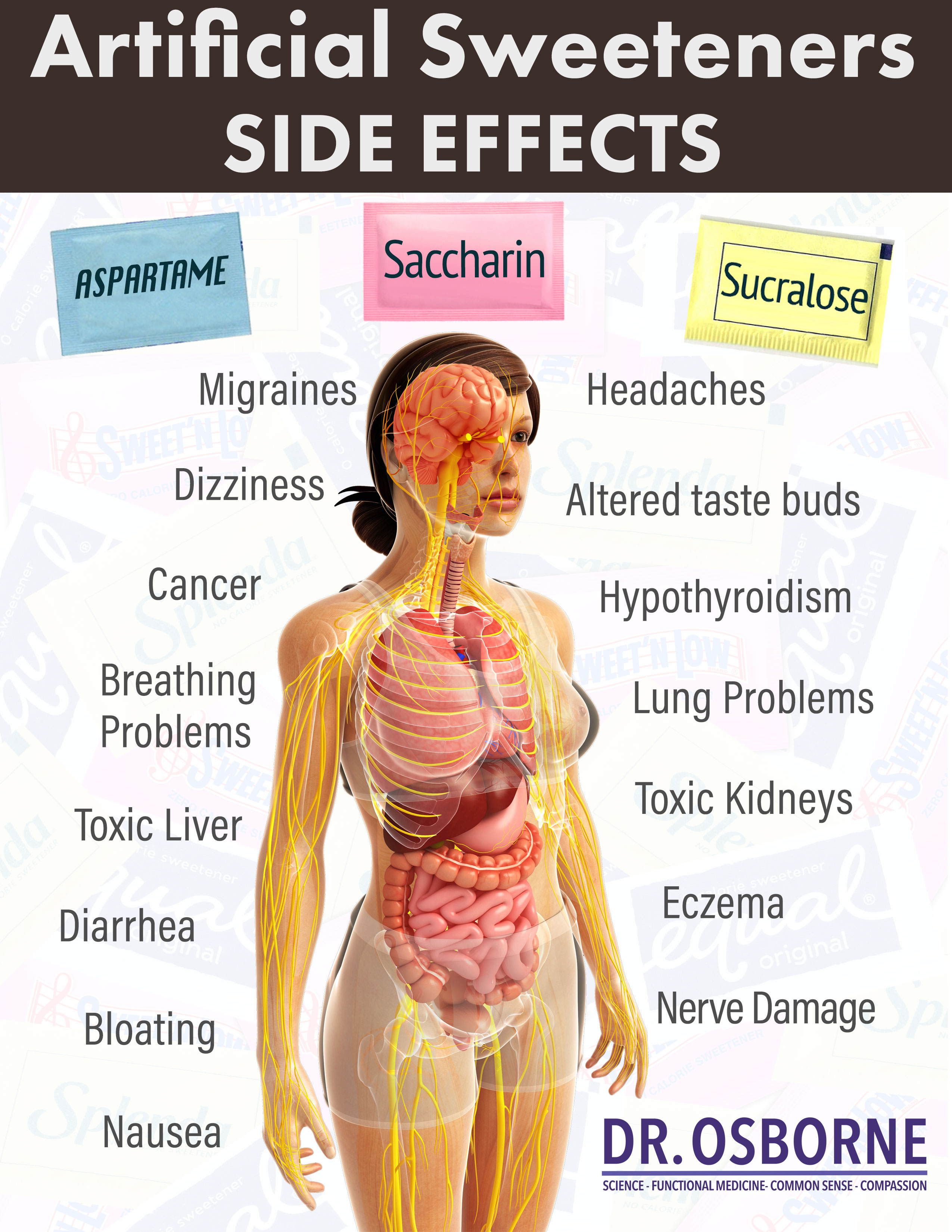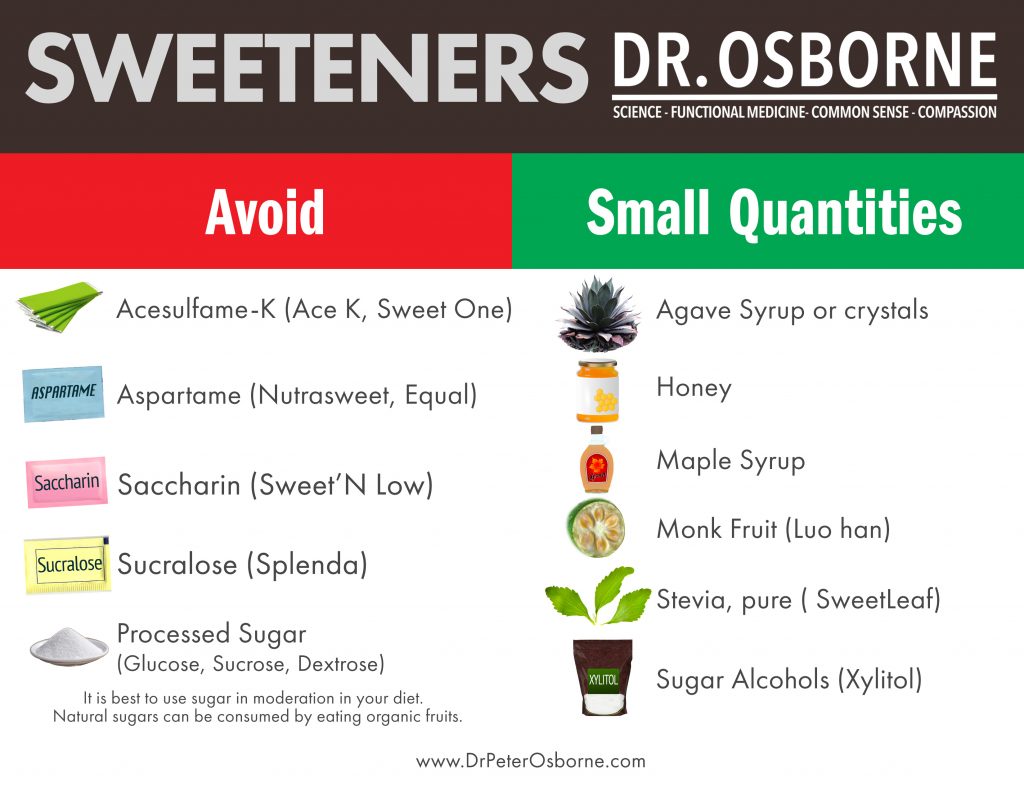Artificial Sweeteners and Toxic Side Effects
From Dr. Peter Osborne

Artificial Sweeteners and Toxic Side Effects
If your goal is to reduce your caloric intake and to lose weight, artificial sweeteners are not the way to go.
We see many varieties of these so-called “sugar substitutes” on the grocery store shelf. The most common substitutes are sucralose (Splenda), aspartame (NutraSweet, Equal, Sugar Twin), and saccharin (Sweet’N Low). Consumers quickly reach for these artificial sweeteners in order to satisfy their sugar craving while ingesting little to no added calories. However, many consumers do not know the possible side effects and health risks associated with the ingestion of chemically processed artificial sweeteners.
The FDA has a list of artificial sweeteners, which are termed high-intensity sweeteners, approved for use as food additives. These include saccharin, aspartame, acesulfame potassium (Ace-K), sucralose, neotame, advantame, and stevia. All of these are labeled GRAS (generally recognized as safe by the FDA). Only those with phenylketonuria (PKU) should avoid aspartame consumption. The American Dietetic Association states that children under 2 years of age, pregnant women, and lactating women should not use artificial sweeteners, even though they are deemed safe by the FDA. 1,3
What products and foods contain artificial sweeteners?
Many processed products contain these artificial sweeteners including chewing gum, breath mints, beverages, alcoholic beverages, dairy products, salad dressings, desserts, candies, gelatin, preserves, baked goods, toothpaste, mouthwashes, yogurts, vitamins, children’s vitamins, pharmaceuticals, breakfast cereals, snack foods, soups, and tabletop sweeteners. For the average consumer, these sweeteners are not easily identified on a food label. Most processed products will be labeled “sugar-free”, but will contain an artificial sweetener. For those with grain sensitivities, manufacturers will utilize corn as fillers to make these artificial sweeteners, which can create an inflammatory response in the body4. All of these processed products containing artificial sweeteners will continue to mislead consumers if labels are not read carefully.
What are the health risks associated with artificial sweeteners?
Current research is limited on the beneficial effects and the long term health risks associated with the ingestion of artificial sweeteners. However, cyclamate (an early artificial sweetener), was banned by the FDA in 1970 due to severe carcinogenic risks in experimental animals. With this ban, the artificial sweetener market took a hit. Consumers were left scared knowing there could be a cancer risk associated with the ingestion of artificial sweeteners. Shortly after, manufacturers replaced one toxic artificial sweetener with new equally toxic sweetener. Many consumers report headaches, dizziness, rashes, bloating, nausea, diarrhea, and digestive problems after ingesting artificial sweeteners. These side effects on the body could build up over time and cause serious long term diseases with regular consumption of these artificial sweeteners.
Currently, the great debate is between the FDA and scientists. In a study determining the effects of saccharin, sucralose, and aspartame consumption in both mice and humans, the ingestion of artificial sweeteners altered microbial metabolic pathways6. Studies indicated glucose intolerance was elevated due to changes in gut microbiota. Gut health has to be optimal in order to maintain a healthy immune system and normal metabolic functions in our body. Such metabolic functions include maintaining normal blood pressure, blood glucose, and cholesterol levels. More studies need to be conducted, especially on the brain, but scientists believe that there is also a relationship between sweeteners and certain cancers, chronic fatigue syndrome, Parkinson’s disease, Alzheimer’s disease, multiple sclerosis, autism, and systemic lupus.7
In numerous studies observing weight loss with the ingestion of artificial sweeteners, there is not enough proof that consumption is beneficial in weight management2. Studies are able to show short-term weight loss but lack any long term weight loss results. However, consumers are still consuming artificial sweeteners in order to reduce their caloric intake with the intent of weight loss based on physician’s recommendations.
Artificial Sweeteners can also develop into an addiction. Take a look at this comparison of artificial sweeteners vs sugar: these processed sugars are 200-13,000 times sweeter than regular sugar5. Over time, the consumption of these artificial sweeteners can alter taste buds and result in a constant craving for foods that are overly sweet. More nutritious foods such as fruits and vegetables become less palatable, so less nutritious sugar-free substitutes and carbohydrates are consumed instead. Consequently, risks for nutrient deficiencies and weight gain increase.
What kind of sweeteners are safe to use?
In order to satisfy one’s sweet craving, utilize all-natural sugars. These sugars include agave syrup or crystals, local honey, maple syrup, monk fruit (luo han), and Stevia (pure)4. These sugars are pure, made by nature, not in a lab, and do not undergo the high chemical processing of artificial sweeteners. For optimal nutrition levels, sugars should be used in moderation, obtained by organic fruit consumption or eliminated from the diet.

With all these mixed bags of information and lack of long term studies, we should steer clear of all artificial sweeteners. They are, after all, processed products. Why take the unnecessary health risks consuming artificial sweeteners, a product filled with chemicals, grain fillers, and a long list of side effects?
If it’s a yellow, blue, or pink packet, throw it away! Or if packaged foods say sugar-free, leave it on the grocery shelf! It could be toxic! Contact us today if you have any questions.
References
1. Ansel, K. (2014). The Inside Scoop on Artificial Sweeteners. Retrieved from Eat Right
2. Bruyere, O., et al. (2015). Review of nutritional benefits and risks related to intense sweeteners. Arch Public Health, 73(41). doi: 10.1186/s13690-015-0092-x.
3. FDA. (2015). Additional Information about High-Intensity Sweeteners Permitted for use in Food in the United States. Retrieved from FDA
4. Osborne, Peter. (2016). No Grain, No Pain: a 30-day diet for eliminating the root cause of chronic pain. New York, NY: Touchstone.
5. Spencer, M., et al. (2016). Artificial Sweeteners: A Systematic Review and Primer for Gastroenterologists. J Neurogastroenterol Motil, 22(2), 168-http://dx.doi.org/10.5056/jnm15206
6. Suez, J., Koram, T., Zilberman-Schapira, G., Segal, E., Elinav, E. (2015). Non-caloric artificial sweeteners and the microbiome: findings and challenges. Gut Microbes, 6(2), 149-155. doi: 10.1080/19490976.2015.1017700
7. Whitehouse, C.R., Boullata, J., McCauley, L.A. (2008). The potential toxicity of artificial sweeteners. American Association of Occupational HealthNurses, 56(6), 251-259.

Get your copy from our Online Store or your local book and magazine retailer
Australian Retail Locations » Uncensored Publications Limited
New Zealand Retail Locations » Uncensored Publications Limited
As censorship heats up and free thought becomes an increasingly rare commodity, we appeal to our readers to support our efforts to reach people with information now being censored elsewhere. In the last few years, Uncensored has itself been censored, removed from the shelves of two of our biggest NZ retailers – Countdown Supermarkets and Whitcoulls Bookstores – accounting for 74% of our total NZ sales.
You can help keep the Free Press alive by subscribing and/or gifting a subscription to your friends and relatives.








